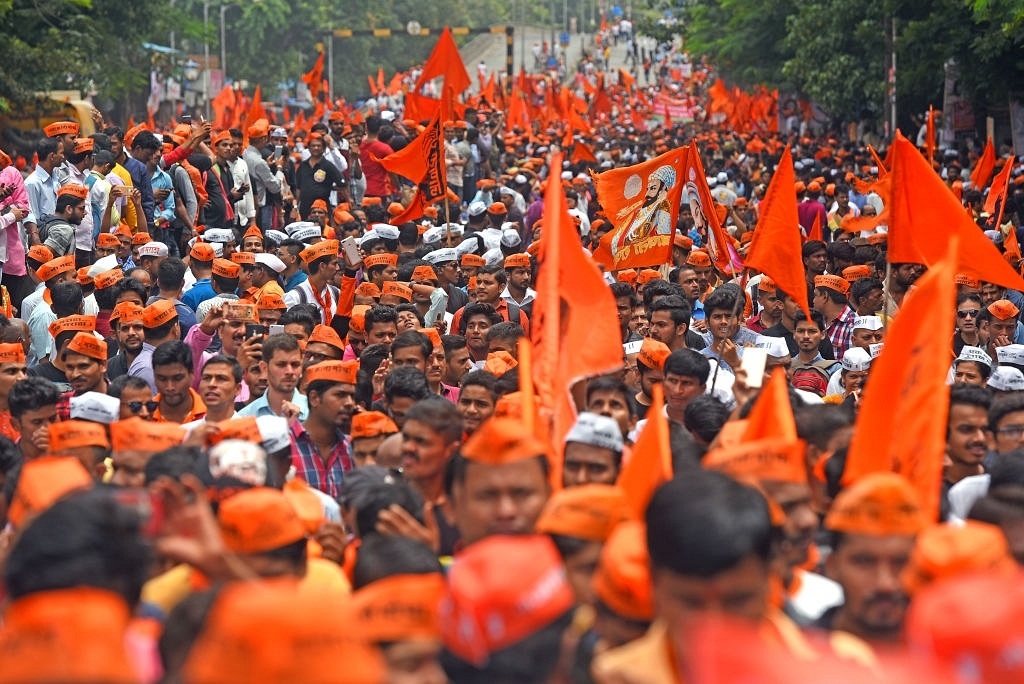Insta
Amidst Chants Of “Chhatrapati Shivaji Maharaj Ki Jai!”, Maharastra Assembly Passes Bill For Maratha Reservation

Protests demanding Maratha reservations. (Pratik Chorge/Hindustan Times via Getty Images)
Amidst chants of "Chhatrapati Shivaji Maharaj ki jai!", the Maratha Reservation Bill, piloted by the Bharatiya Janata Party-led state government, was unanimously passed in the the lower house of Maharashtra Legislative Assembly, with support from the Shiv Sena, Congress and the Nationalist Congress Party.
The bill provides for reservation of seats for admission in educational institutions and posts in public services to Marathas who have been declared as a socially and educationally backward class.
The approved bill has now been sent to the Upper House of the legislative assembly for approval.
Chief Minister Devendra Fadnavis, who tabled the bill, thanked the Opposition members for helping in passage of the bill unanimously.
Earlier, Fadnavis also tabled the action taken report (ATR) on the State Backward Class Commission’s (SBCC) recommendations for reservation to the Maratha community in government jobs and education. He also tabled the recommendations of the State Backward Class Commission (SBCC)’s report on social, educational and financial status of the Maratha community.
The state government had received the SBCC report on 15 November, which recommended 16 per cent reservation for the "socially and economically backward" community. SBCC said that they are entitled to reservation benefits and advantages enshrined in the Articles 15(4) and 16(4) of the Constitution, it said.
The panel had suggested that looking at exceptional circumstances and extraordinary situations generated on declaring Marathas as socially and educationally backwards and their consequential entitlement to reservation benefits, the government may take appropriate decision within constitutional provisions to address the emerging scenario in the state.
The report also noted that the 16 percent reservation for Marathas has to be provided without jeopardising the existing quota reserved for Other Backward Classes (OBCs). Various castes numbering over 350 are currently categorised as OBCs and account for 26 per cent of Maharashtra’s population.
The composite Maratha-Kunbi caste, meanwhile, constitutes about 32-33 percent of Maharashtra's population. The Maratha-Kunbis are a highly stratified caste cluster, largely comprising the peasant cultivators but reaching up to feudal aristocrats and rulers.
Over the last few years, Maharashtra has seen several agitations demanding reservation for the Maratha community under the Other Backward Classes (OBC) quota. However, the earlier demands for reservation had been categorically rejected by various commissions set up by both the state and central governments. This includes the Kalelkar Commission (1955), the Mandal Commission (1980) and the Central Backward Classes Commission (2004).
Several reports of the state backward classes commissions, including most recently that of the Bapat Commission, also rejected the Maratha demand for reservation. Justice Bapat was of the opinion that including the Marathas under the OBC category would be against any semblance of social justice.
Ignoring the repeated dismissal of this demand by various committees, the allegedly Maratha-elite-dominated Congress-Nationalist Congress Party (NCP) government, with an eye on its electoral fortunes, went ahead and appointed yet another committee, led this time by Narayana Rane, to examine this matter.
In a desperate attempt, in the run up to the 2014 elections, the Congress-NCP government (after vacillating for 15 years in power) granted the community 16 per cent reservation in education and jobs (and along with it, also introduced 5 per cent quota for Muslims). However, the Bombay High Court on 23 September quashed the decision to give 16 per cent reservation to the Marathas. The bench headed by Chief Justice Mohit Shah at the Supreme Court had already laid down the law that reservation cannot exceed 50 per cent of the total seats.
(Inputs from PTI)
Support Swarajya's 50 Ground Reports Project & Sponsor A Story
Every general election Swarajya does a 50 ground reports project.
Aimed only at serious readers and those who appreciate the nuances of political undercurrents, the project provides a sense of India's electoral landscape. As you know, these reports are produced after considerable investment of travel, time and effort on the ground.
This time too we've kicked off the project in style and have covered over 30 constituencies already. If you're someone who appreciates such work and have enjoyed our coverage please consider sponsoring a ground report for just Rs 2999 to Rs 19,999 - it goes a long way in helping us produce more quality reportage.
You can also back this project by becoming a subscriber for as little as Rs 999 - so do click on this links and choose a plan that suits you and back us.
Click below to contribute.
Latest